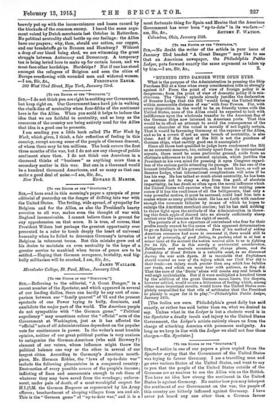[To ran Noma or ra. "Iirsorsros."1
Sui,—No doubt the writer of the article in your issue of January 23rd headed "A Great Danger" may like to see that an American newspaper, the Philadelphia Pubfis Ledger, puts forward exactly the same argument as taken up by him.—I am, Sir, Ac., Z.
"RUNNING INTO DANGER WITH OPEN EYES. What is the purpose of the Administration in pressing the Ship Purchase Bill at a time when every consideration tells so strongly against it? From the point of view of foreign policy it is daugerouaj from the point of view of domestio policy it is mis- chievous. The `Dacia' episode already justifies the declaration of Senator Lodge that the Bill would bring the United States within measurable distance of war' with four Powers. For, with every disposition in the world to be on friendly terms with the United States, none of the Allies could be expected to look with indifference upon the wholesale transfer to the American flag of the German ships now interned in American ports. That this would be in effect an attempt to avoid the consequences of the enemy character of the vessel is morally if not legally certain. That it would be favouring Germany at the expense of the Allies, and so be a covert if not an open breach of neutrality, is also clear. And if the object of the Bill is not the purchase of Gorman ships, what earthly good can it accomplish?
Since all those best qualified to judge have condemned the Bill as an economic measure, too, entirely apart from its international aspects, there must be some particular ground, aside from en obstinate adherence to his personal opinions, which justifies the President in his own mind for pressing it upon Congress regard- less of the serious perils attending its passage. He has one of the keenest intellects of his generation, and he must know, as well as Senator Lodge, what international complications will arise if he has his way. He has talked so much about neutrality, he has been ao anxious not to stray a step from the path of abeolut• impartiality, he has dwelt so often upon the moral influence which the United States will exercise when the time for making pesos comes if it has the confidence of all the belligerents, that only • very powerful motive, it must be assumed, could load him into a course where no many pitfalls exist. He has set forth with candour enough the economic fallacies by means of which he hopes to
enlarge the American merchant marine; but ho has said nothing
to throw light upon the attitude of the Administration in throw- ing this fresh apple of discord into an already suMeiently sharp contest over the exercise of the right of search.
The protests of a few exporters of contraband who fear for their profits surely cannot be the cause of this apparent determination to go on fishing in troubled waters. Even if his method of aiding American commerce had more to commend it, there would still be a lark of generosity, of good feeling, in pushing what is at best a minor issue at the moment the nation nearest akin to us is fighting for its life. Nor is this merely a sentimental. consideration. Belligerents and neutrals occasionally change places, and the friendship of Great Britain is a valuable asset, as we discovered during the mar with Spain. It is inevitable that Englishmen should remind us now of the injury which our Civil War did to their trade—an injury much greater than any which has befallen our trade, and which we must bear with patience, as they did. That the case of the 'Dacia ' alone will create any real breach is well-nigh unthinkable. But if it were multiplied a hundred times by the addition of the great German ocean liners, the dispute, however settled, would create a bitterness of feeling which, among other more important results, would leave the United States com- pletely unqualified for that rills of arbitrator that the President no plainly is eager for it to play."—Philadelphia Public Ledger, January 24th.
[The italics are ours. Philadelphia's great daily has said exactly, or rather has said better than we, what we desired to say. Unless what in the Ledger is but a choleric word is is the Spectator a deadly insult and injury to the United States Government, the Ledger's article entirely clears us from the charge of attacking America with poisonous malignity. A• long as wo keep in line with the Ledger we shall not fear these charges.—En. Spectator.]






































 Previous page
Previous page